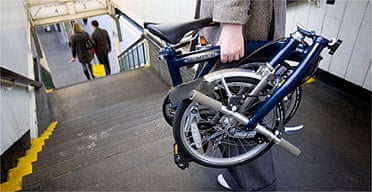Folding bikes date back to the second world war, when simple "fold-in-the-middle" versions were used by soldiers infiltrating enemy lines. But the modern, ultra-compact design was pioneered in this country by the Bickerton bike company and, despite going under in 1991, these bikes can still be seen on the streets today.
After Bickerton came Brompton, the name most commonly associated with folders. Bike lover Andrew Ritchie felt he could improve the Bickerton and came up with some prototypes which went into production in 1975. The Brompton is popular because it folds simply, tucks away neatly and has rollers underneath, making it easy to wheel around.
"The Brompton folding bike sets the standard for all other folding bikes," says Mike Hessey, a member of the Folding Society (www.foldsoc.co.uk). "While many companies have tried to copy the design, none has managed to get the same level of quality."
Hessey attributes the rising popularity of folding bikes on anti-car schemes such as London's congestion charge. "People are being forced to think of different travel options, and being so portable, the Brompton is the perfect commuter bike. Folders are easier to store indoors too, making them much more secure."
The fact that cyclists face more and more restrictions from carrying full-size bikes on public transport is clearly another reason for this growing popularity. But it does also seem that the traditional, distorted belief that folding bikes signify poorer quality and a propensity to collapse is changing.
A host of manufacturers have joined this booming market, and Brompton has plans to raise its output by 50%. The main problem now is that demand for some brands is outstripping supply.
The classic
Brompton S2LX
www.bromptonbicycle.co.uk
£1,007
Brompton is the leading name associated with British folding bikes, and its models are still made at its headquarters in Brentford, west London. The great merit of the Brompton is that it folds brilliantly - smaller and quicker than virtually any alternative. That convenience is what you're buying: for riding characteristics, they're not the best - neither as light nor as stable as some of the competition. But for short trips between train and the office, say, they remain the benchmark. This bike has a two-gear system and is fitted with an upgraded saddle.
Light and fun
Dahon Mu SL
www.dahon.com
£799.99
Weighing only 8.7 kilos, the Dahon website promotes this bike as "the world's lightest production folding bike". Weighing so little means you can build up real speed, and the frame's excellent rigidity provides really sure-footed, predictable handling. This is an 8-speed bike with handy adjustable handlebar height, and the front wheel has suspension to offer a smoother ride. With the Mu, Dahon has really cracked the problem of making a folder that's actually fun to ride.
Sporty
Airnimal Joey Sport
www.airnimalfoldingbikes.com
£695
As the name implies, Airnimal makes folding bikes that work not so much for the train commuter as the international traveller. Which is why, for instance, you can buy a hard suitcase to pack your Joey in, whereas the Brompton has a soft bag. The folding system is not as compact or quick as some, but these are light, rigid, quick bikes which, with their larger-diameter wheels (24in), give possibly the closest to conventional bike performance and feel of any folder. The Joey also has a telescopic seat pin and an 8-speed twist grip shifter. A good choice for the more demanding and sporty cyclist.
Public transport restrictions
Trains
Despite all the talk of eco-friendly travel, the ubiquity of sliding-door trains with no guard's vans has drastically reduced the space available to carry full-sized bikes, and many train operators won't take them during peak hours (the Docklands Light Railway doesn't allow them at all). Some charge for carrying bikes at any time, although East Anglian operator One did drop all of its charges at the start of this year. Bicycle reservations are still required on One's Intercity services and are actively encouraged on its local routes.
You should also make a reservation before taking your bike on Central Citylink, First ScotRail, First TransPennine Express, Hull, Midland Mainline, South West Trains and Virgin. Folding bikes may be carried free at all times on the National Rail network - although Silverlink limits them to one per carriage at peak times. Eurostar only accepts folding bikes.
Buses and coaches
While most bus companies, including National Express and Megabus, won't carry full-sized bikes, the majority say they will allow folding bicycles at the driver's discretion.
London Underground
Full-sized bicycles are banned at all times from the Victoria and Waterloo and City lines, and at peak times (7.30am-9.30am and 4pm-7pm) from all but the Bakerloo line between Queen's Park and Harrow and Wealdstone. They are also banned from many central tube sections as you can't take bikes on moving escalators - see www.tfl.gov.uk for a map.
Planes and ferries
Most airlines charge for any sporting equipment to be carried on board, although British Airways does allow an additional piece of sporting luggage at no extra cost, depending on its weight. Both P&O and Condor ferries allow bikes on board their boats.
